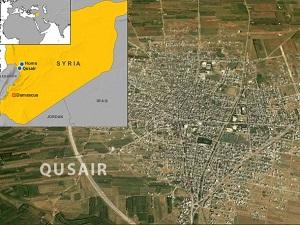(Ahlul Bayt News Agency) - As intransigent and rabid as could be, this campaign involved the Persian Gulf Cooperation Council, now waving sanctions against Hizbullah supporters. This is an unfamiliar measure by the Persian Gulf which usually does not go that far in its animosity when it is a political party that is targeted.
Hizbullah was certainly expecting this storm, with all its implications and dimensions, ever since it decided to seriously engage in the battles in Qusayr and especially in Homs countryside.
Some sources communicating with Hizbullah command mentioned that an internal rival had secretly sent a message to the party shortly before Qusayr's battle, hereby saying, "You demand the 'guaranteeing third' in the government which formation is underway. We are ready to meet this demand under the condition that you don't go to the battlefield in Homs countryside."
Moreover, the party received more messages from the concerned European states hereby imploring it not to partake in the military confrontation in Qusayr if it wished to maintain stable relations with Europe and to be off the terrorism blacklist.
Still, Hizbullah could not care any less about the tempting leverages. It instead turned a cold shoulder to the threats and dispatched its best fighters to Qusayr to lead a fierce battle that has tipped the strategic power balance on the Syrian arena, flaming since two years and three months, and caused an uninterrupted series of reverberations.
But what is it that Hizbullah has done in confrontations it knew they would give the chance to its rivals to level a concerted sectarian, political, and economic campaign? The party knows well that it has broken the course of equations most of Arabs and the West were endeavoring to impose in Syria. More specifically, Hizbullah's decision to participate in Qusayr has three consequences:
1- The party has defied all the equations and red lines its rivals were seeking to clinch around it. It has even crossed the frontiers of Lebanon to become a regional power to be taken into account now and in the future.
2- The participation in Qusayr battles begot a crushing defeat that was not considered by the enemies of the Syrian regime.
A lot has been written and said about the strategic importance of Qusayr and its surroundings. Yet the military outcome has just surprised everyone.
Oppositionists of the Syrian regime have sought to make of Qusayr the next "Stalingrad" as they sent more than 4000 professional fighters underground geared up with weaponries and arsenals so that they resist for months. Major losses have been incurred upon them instead.
The city fell in less than ten days, leaving 1500 dead and thousands wounded. The rest were either captured or managed to escape.
In counterpart, less than 80 Hizbullah fighters were killed and 160 were injured, while the party was expecting the casualties toll to be way more than this and the battle, aiming to liberate what is tantamount to fifth the area of Lebanon, to last longer.
For their part, countries linked to the opposition considered that Hizbullah participation in the fights has wasted, within few days, the tremendous efforts that were made for more than 18 months.
3- The outcome of Qusayr's battle has changed the equations on the Syrian scene and even in Lebanon. After talks behind closed doors focused on the party's fate following the regression of the Syrian regime, attention has become fixed on what Hizbullah would do to rivals after the fresh headway of battles. Concerned parties are wondering now about what to do when the party moves its fighters to Aleppo.
It is no more a secret that building on the results of Qusayr's battle, international calculi, especially in Moscow, have changed. Hizbullah has made of itself a regional linchpin after many have thought that the UN resolution 1701 would tighten the noose around the party and then lead it to lose its internal role after July war in 2006.
Therefore, Hizbullah and observers understand well the rabid attack against the party, who is now making the headlines in the Persian Gulf.
/106

